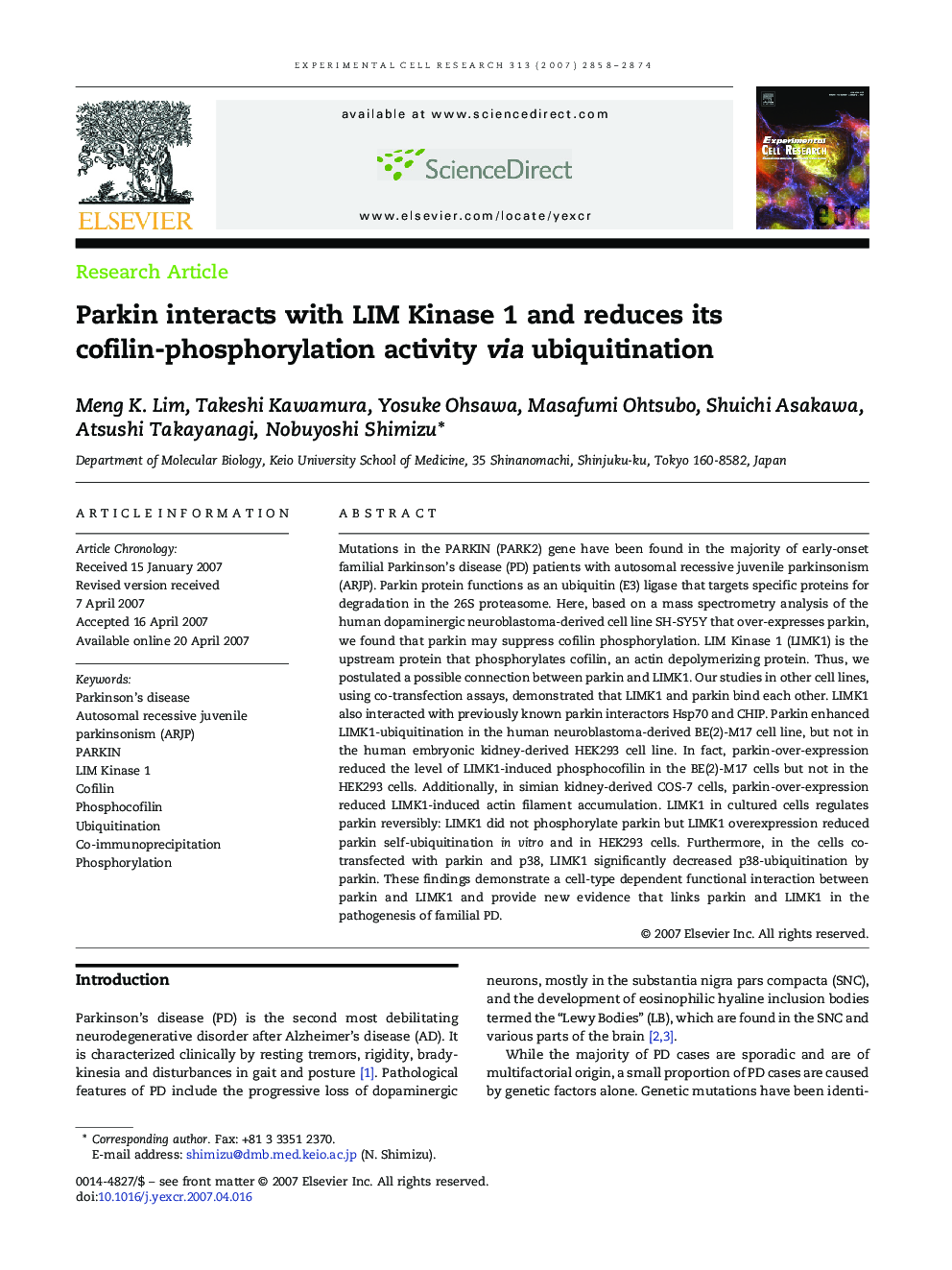| کد مقاله | کد نشریه | سال انتشار | مقاله انگلیسی | نسخه تمام متن |
|---|---|---|---|---|
| 10904745 | 1086690 | 2007 | 17 صفحه PDF | دانلود رایگان |
عنوان انگلیسی مقاله ISI
Parkin interacts with LIM Kinase 1 and reduces its cofilin-phosphorylation activity via ubiquitination
دانلود مقاله + سفارش ترجمه
دانلود مقاله ISI انگلیسی
رایگان برای ایرانیان
کلمات کلیدی
موضوعات مرتبط
علوم زیستی و بیوفناوری
بیوشیمی، ژنتیک و زیست شناسی مولکولی
تحقیقات سرطان
پیش نمایش صفحه اول مقاله

چکیده انگلیسی
Mutations in the PARKIN (PARK2) gene have been found in the majority of early-onset familial Parkinson's disease (PD) patients with autosomal recessive juvenile parkinsonism (ARJP). Parkin protein functions as an ubiquitin (E3) ligase that targets specific proteins for degradation in the 26S proteasome. Here, based on a mass spectrometry analysis of the human dopaminergic neuroblastoma-derived cell line SH-SY5Y that over-expresses parkin, we found that parkin may suppress cofilin phosphorylation. LIM Kinase 1 (LIMK1) is the upstream protein that phosphorylates cofilin, an actin depolymerizing protein. Thus, we postulated a possible connection between parkin and LIMK1. Our studies in other cell lines, using co-transfection assays, demonstrated that LIMK1 and parkin bind each other. LIMK1 also interacted with previously known parkin interactors Hsp70 and CHIP. Parkin enhanced LIMK1-ubiquitination in the human neuroblastoma-derived BE(2)-M17 cell line, but not in the human embryonic kidney-derived HEK293 cell line. In fact, parkin-over-expression reduced the level of LIMK1-induced phosphocofilin in the BE(2)-M17 cells but not in the HEK293 cells. Additionally, in simian kidney-derived COS-7 cells, parkin-over-expression reduced LIMK1-induced actin filament accumulation. LIMK1 in cultured cells regulates parkin reversibly: LIMK1 did not phosphorylate parkin but LIMK1 overexpression reduced parkin self-ubiquitination in vitro and in HEK293 cells. Furthermore, in the cells co-transfected with parkin and p38, LIMK1 significantly decreased p38-ubiquitination by parkin. These findings demonstrate a cell-type dependent functional interaction between parkin and LIMK1 and provide new evidence that links parkin and LIMK1 in the pathogenesis of familial PD.
ناشر
Database: Elsevier - ScienceDirect (ساینس دایرکت)
Journal: Experimental Cell Research - Volume 313, Issue 13, 1 August 2007, Pages 2858-2874
Journal: Experimental Cell Research - Volume 313, Issue 13, 1 August 2007, Pages 2858-2874
نویسندگان
Meng K. Lim, Takeshi Kawamura, Yosuke Ohsawa, Masafumi Ohtsubo, Shuichi Asakawa, Atsushi Takayanagi, Nobuyoshi Shimizu,